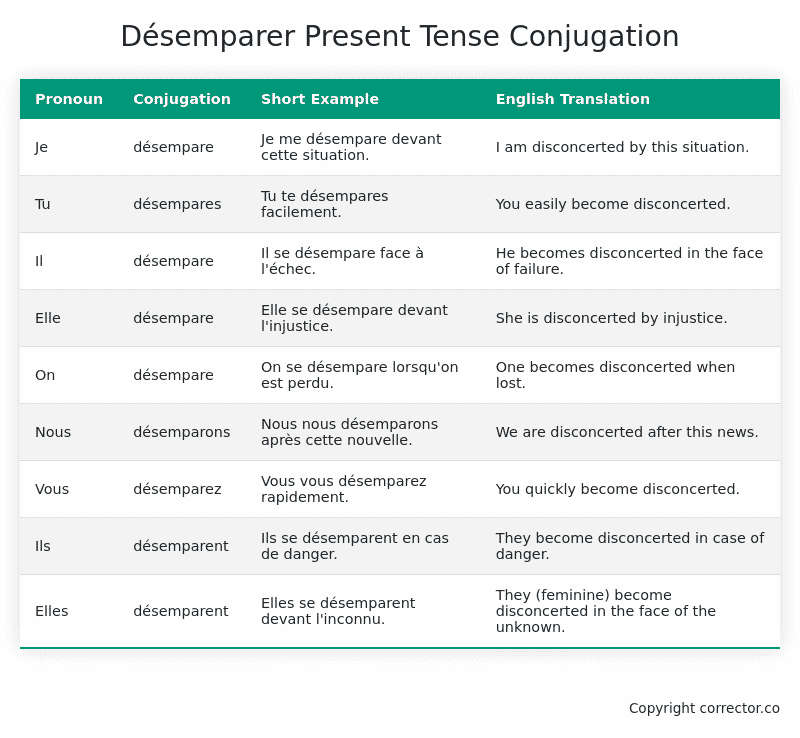Le Present (Present Tense) Conjugation of the French Verb désemparer
Introduction to the verb désemparer
The English translation of the French verb “désemparer” is “to dismast.” The infinitive form “désemparer” is pronounced as [dey-zahn-pa-ray].
The word “désemparer” originated from the Old French word “desemparer,” which meant “to lose control.” In everyday French, it is commonly used in nautical terms to describe the action of a ship losing its mast or masts.
Examples:
- Le navire s’est désamarré lors de la tempête. – The ship dismasted during the storm.
- Nous avons dû désemparer le voilier après une collision. – We had to dismast the sailboat after a collision.
- Il a fallu désemparer rapidement pour éviter le naufrage. – We had to dismast quickly to avoid shipwreck.
Désemparer – About the French Present Tense
To take a deep dive into all the French tenses then see our article on Mastering French Tense Conjugation.
Common Everyday Usage Patterns For Le Present
Interactions with Other Tenses
Table of the Present Tense Conjugation of désemparer
| Pronoun | Conjugation | Short Example | English Translation |
|---|---|---|---|
| Je | désempare | Je me désempare devant cette situation. | I am disconcerted by this situation. |
| Tu | désempares | Tu te désempares facilement. | You easily become disconcerted. |
| Il | désempare | Il se désempare face à l’échec. | He becomes disconcerted in the face of failure. |
| Elle | désempare | Elle se désempare devant l’injustice. | She is disconcerted by injustice. |
| On | désempare | On se désempare lorsqu’on est perdu. | One becomes disconcerted when lost. |
| Nous | désemparons | Nous nous désemparons après cette nouvelle. | We are disconcerted after this news. |
| Vous | désemparez | Vous vous désemparez rapidement. | You quickly become disconcerted. |
| Ils | désemparent | Ils se désemparent en cas de danger. | They become disconcerted in case of danger. |
| Elles | désemparent | Elles se désemparent devant l’inconnu. | They (feminine) become disconcerted in the face of the unknown. |
Other Conjugations for Désemparer.
Le Present (Present Tense) Conjugation of the French Verb désemparer (You’re reading it right now!)
Imparfait (Imperfect) Tense Conjugation of the French Verb désemparer
Passé Simple (Simple Past) Tense Conjugation of the French Verb désemparer
Passé Composé (Present Perfect) Tense Conjugation of the French Verb désemparer
Futur Simple (Simple Future) Tense Conjugation of the French Verb désemparer
Futur Proche (Near Future) Tense Conjugation of the French Verb désemparer
Plus-que-parfait (Pluperfect) Tense Conjugation of the French Verb désemparer
Passé Antérieur (Past Anterior) Tense Conjugation of the French Verb désemparer
Futur Antérieur (Future Anterior) Tense Conjugation of the French Verb désemparer
Subjonctif Présent (Subjunctive Present) Tense Conjugation of the French Verb désemparer
Subjonctif Passé (Subjunctive Past) Tense Conjugation of the French Verb désemparer
Subjonctif Imparfait (Subjunctive Imperfect) Tense Conjugation of the French Verb désemparer
Subjonctif Plus-que-parfait (Subjunctive Pluperfect) Tense Conjugation of the French Verb désemparer
Conditionnel Présent (Conditional Present) Tense Conjugation of the French Verb désemparer
Conditionnel Passé (Conditional Past) Tense Conjugation of the French Verb désemparer
Conditionnel Passé II (Conditional Past II) Tense Conjugation of the French Verb désemparer
L’impératif Présent (Imperative Present) Tense Conjugation of the French Verb désemparer
L’impératif Passé (Imperative Past) Tense Conjugation of the French Verb désemparer
L’infinitif Présent (Infinitive Present) Tense Conjugation of the French Verb désemparer
L’infinitif Passé (Infinitive Past) Tense Conjugation of the French Verb désemparer
Le Participe Présent (Present Participle) Tense Conjugation of the French Verb désemparer
Le Participe Passé (Past Participle) Tense Conjugation of the French Verb désemparer
Struggling with French verbs or the language in general? Why not use our free French Grammar Checker – no registration required!
Get a FREE Download Study Sheet of this Conjugation 🔥
Simply right click the image below, click “save image” and get your free reference for the désemparer present tense conjugation!

I hope you enjoyed this article on the verb désemparer. Still in a learning mood? Check out another TOTALLY random French verb present conjugation!


